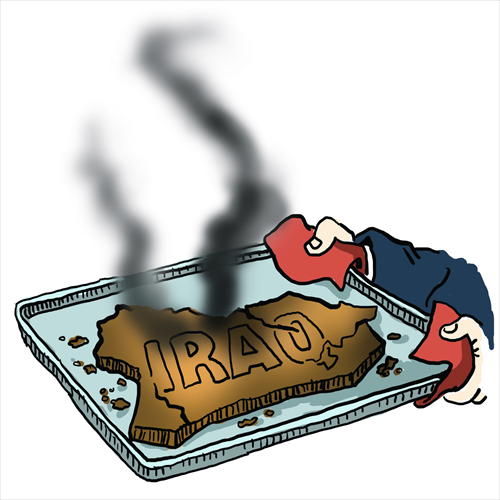ISIS crisis brings West’s arrogance home

Illustration: Liu Rui/GT
Iraq is burning, literally and metaphorically. But this conflagration did not start yesterday. The fuses that lit the fires of violence, hate and sectarianism engulfing that country were started by those who are now trying desperately to disown responsibility for past actions that are today threatening to tear Iraq apart.
Those in the dock are the major Western powers - the transatlantic duo of the US and the UK in particular - that illegally invaded Iraq, supposedly in search of "Weapons of Mass Destruction" which were never found.
That was in 2003. But the same Western meddling and perfidy that carved up the region almost 100 years ago in the aftermath of WWI laid the foundations for what is happening today.
A secret Anglo-French agreement was struck between Sir Mark Sykes and Francois Georges Picot to truncate the Middle East after the war. It was so confidential that even the US was unaware of it.
But in order to achieve these imperial ambitions, Britain under David Lloyd George reneged on full independence for the Arabs promised to Sharif Hussein, the Emir of Mecca, for launching an Arab revolt against the Ottoman empire in support of the British.
Correspondence of the time, especially the Sir Henry McMahon-Sharif Hussein letters and subsequent correspondence, made enlightening reading.
From the Sykes-Picot secret deal was born Iraq, Lebanon and Syria as we know them today, to be followed by Jordan, Saudi Arabia and Israel. What is interesting is that the boundaries dividing most of these modern states are virtual straight lines as the two Western powers picked up the spoils and are not much different to the way in which they drew up frontiers on the African continent.
Why does the secret Anglo-French agreement of almost 100 years ago, and the dumping of the promise for Arab independence, matter today?
Sharif Hussein and other prominent Arabs of the time looked forward to an independent Arab homeland spreading across Greater Syria. British duplicity ended that dream.
The Islamic State in Iraq and Syria (ISIS) is using the duplicity inherent in the Sykes-Picot as a clarion call. Its goal of a large Sunni sectarian state, which goes beyond the borders of modern Iraq, is surely an attempt to reverse the perceived betrayal by Britain of the Arabs in the early decades of the last century.
The capture of Mosul, Iraq's second largest city and a prize over which the Anglo-French allies tussled for control because of gas reserves, marks a major victory in the march to an enlarged Arab state. Chief among them is former British prime minister Tony Blair. He tried to absolve himself during a talk show in London the other day, saying the 2003 invasion is not to blame for the shambolic state of Iraq today.
Other supporters in the Blair government, such as then deputy prime minister John Prescott, chancellor of the exchequer Gordon Brown who later succeeded Blair, and foreign secretary David Miliband, are now distancing themselves from these catastrophic events.
David Cameron's Conservative Party voted for British intervention, which ignored the million or more anti-war protestors who marched in London, in one of the biggest demonstrations I have seen in Britain.
Now the UK's biggest foreign policy mistake since the 1950s Suez crisis is beginning to show dangerous signs of coming home to roost.
The US triumphantly announced "Mission Accomplished" when coalition forces occupied Iraq. Blair gloated over the return of freedom and security to the Iraqi people.
A few months afterward, I was at a BBC Trust conference where much was said about press freedom now in "liberated" Iraq.
I spoke to several of those journalists. Yes, they said, there was more freedom to write. But to exercise that freedom they needed to leave their homes. That was extremely dangerous given the prevailing violence on the streets. Their message? Freedom without security.
Now fear of jihadist violence in the streets of London is beginning to worry British leaders, as an estimated 400 or more British-born fighters are said to have joined ISIS in battle, mainly in Syria.
Cameron warned in parliament recently that those fighting in Iraq and Syria are planning attacks on British soil. The neocolonial adventurism of a decade ago is beginning to haunt Britain.
The author is a veteran Sri Lankan journalist currently living in London. opinion@globaltimes.com.cn